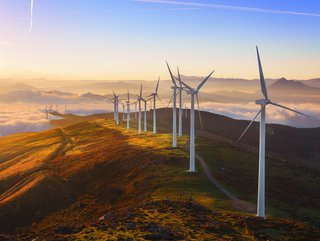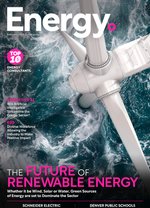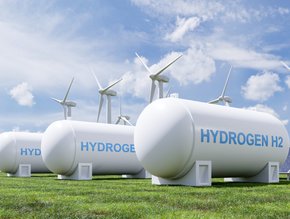Green Energy: The Key to Industry's Sustainable Future

A subset of renewable energy, green energy — generated from natural resources like sunlight, wind or water — includes renewable energy resources that offer the greatest environmental benefit. So, despite all green energy resources being renewable, not all renewable resources are considered green.
The wider renewable power sector is going through an unprecedented spurt of growth — turbocharged as businesses and countries seek to secure energy as a result of the global energy crisis. This factor is one of the main contributors to the world being set to add as much renewable power to its arsenal in the next five years as it did in the last 20.
Numerous green energy solutions are driving positive change, says Rönesans Holdings’ President of Energy Group and Board Member of Rönesans Enerji Emre Hatem, namely energy storage and sustainable transportation.
“Integrating intermittent renewable sources, such as solar and wind, into the grid heavily relies on advances in energy storage technologies, especially batteries,” he explains. “Energy storage solutions play a vital role in enhancing grid stability and reliability by storing excess energy when it is abundant and releasing it when needed.
“And the electrification of transportation, including electric vehicles (EVs) and advancements in battery technology, is having a positive impact by reducing reliance on fossil fuels. Additionally, developing sustainable aviation fuels and biofuels contributes to greener transportation options.”
These solutions, in Hatem’s eyes, represent substantial strides toward a greener future, addressing both the energy production infrastructure and consumption patterns.
Using alternative sources of power is echoed by Arturo DiFilippi, Large Power Offering Director at Vertiv. Speaking from a data centre perspective, an industry estimated to consume 1 to 1.3% of global final electricity demand, he sees this as an opportunity for the sector to reduce emissions by increasing efficiency and equipment utilisation.
He shares: “As a long-term solution, many operators seek to power data centres with alternative energy sources. However, with the utility grids in most regions unlikely to provide 100% renewable power to all customers for the foreseeable future, the onus is on operators to work with their partners to develop solutions that enable carbon-free operation.”
For example, hydrogen produced using renewable energy is a viable solution for on-site energy generation at a wide range of sites, although it isn’t yet easily deployable.
Green energy is integral to long-term renewable strategies
Both Hatem and DiFilippi advocate that alternative sources of energy are increasingly recognised as important for both environmental benefit and resilience and competitiveness of business.
Rönesans Enerji, for example, is currently operating a portfolio of 166 MW of hydro assets and the company has also secured a pipeline of more than 500 MW of wind, solar and battery storage assets. It also aims to develop 2GW of renewable energy by 2028, contributing to Turkey’s green energy transition. This represents an investment of more than US$2bn, accounting for 7% of Turkey's total target for green energy production capacity.
While over at Vertiv, its teams are involved in a European hydrogen and fuel cell project, Vertiv – EcoEdge PrimePower (E2P2), developing a proof-of-concept for how low-carbon fuel cells can provide green power for data centres. A consortium of seven companies – Equinix, InfraPrime, RISE, Snam, SolidPower, TEC4FUELS and Vertiv – are working on integrating solid-oxide fuel cells with uninterruptible power supply (UPS) technology and lithium-ion batteries to provide resilient and clean primary power for data centres and other critical infrastructure. Vertiv also recently opened a Customer Experience Centre in Delaware, Ohio in the United States that demonstrates for the first time UPS systems using fuel cell technologies as a backup power source, via Vertiv’s DynaFlex battery energy storage system (BESS).
Alliances key to contributing to green energy targets
Collaborations are essential in the pursuit of further adoption and the wider accessibility of green energy solutions. Not only does it allow for the fostering of innovation for comprehensive solutions but with the uniting of unique expertise and resources, the industry can work together in pursuit of a common goal, too lofty to be overcome by an individual or a small group.
Hatem advocates: “By pooling resources and expertise, the industry can speed up developing and deploying innovative technologies that contribute to cleaner and more sustainable energy solutions. Energy sustainability involves addressing interconnected challenges such as climate change, resource depletion and environmental degradation, and collaborations enable a holistic approach to problem-solving. Partnerships can promote sustainable business practices and corporate responsibility across the energy supply chain.”
From Hatem’s experience, collaboration is key to making significant strides toward sustainability. For example, Rönesans works closely with TotalEnergies and has recently received a £680m (US$861m) investment from the UK government for a high-speed electrified railway in Turkey spanning 286km across the south of the country which is expected to reduce carbon emissions by an estimated 150,000 tonnes annually.
“We believe in collaborating with customers, peers and other industry leaders on environmental matters regarding critical digital infrastructure,” DiFilippi adds. An example being how Vertiv, as a member of The European Data Centre Association (EUDCA), is helping to contribute to the development of the Climate Neutral Data Centre Pact, which is a major self-regulatory initiative setting guidelines to help meet the European Commission’s goal for climate-neutral data centres by 2050.
The role green energy will play in sustainability pursuits
Off the back of Rönesans Enerji making strides in its own green energy endeavours, such as working towards Turkey’s renewable energy goals with a milestone investment in three wind turbine projects of 189MW with the Nordex Group and Heitkamp Industrial Solutions, the company hopes to increase its installed capacity to 355MW by the end of 2024. This is in line with Rönesans Enerji's goal of producing 2GW of renewable energy by 2028.
“The year 2024 and beyond will be busy for us as we endeavour to realise additional green energy investments in Turkey,” Hatem details. “The evolving landscape is likely to witness increased global cooperation, leveraging shared expertise and resources to address pressing sustainability challenges.”
DiFilippi echoes this,reinforcing the leading role Vertiv plays in advancing the use of dynamic grid support, long duration batteries and fuel cells.
“2024 will be an important year for fuel cell integration,” he predicts. “We will make this new technology available to our customers supporting reduced generator starts and replacement for diesel generators as backup power. This commitment aligns with our broader sustainability goals, showcasing our dedication to minimising environmental impact and embracing innovative solutions. By integrating distributed energy resources, we're not just meeting present demands but anticipating the evolving needs of our industry and contributing to a more sustainable and resilient digital landscape.”
******
Make sure you check out the latest edition of Energy Digital and also sign up to our global conference series - Sustainability LIVE 2024
******
Energy Digital is a BizClik brand







